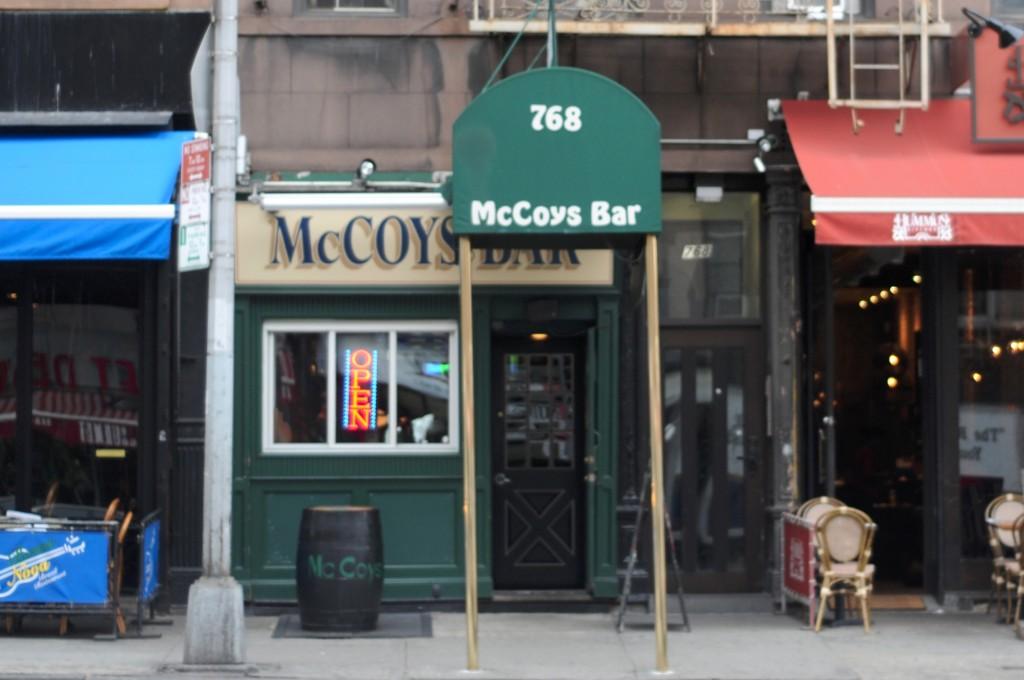Bursting the Bubble: Intolerance Infiltrates Ninth Ave.
Shocked Fordham Community Must Promote Open-Mindedness to Prevent Future Hate Crimes
June 27, 2011

Published: October 8, 2009
When you live on campus at Fordham Lincoln Center, it’s easy to take things for granted. You don’t have to walk in the rain to get to class. Nobody ever has to be a designated driver. No matter what hour of the day or night, there’s a place nearby to get a cup of coffee—even if you’re a moral person and you boycott Starbucks. Ninth Avenue is our home; it’s our default playground. We return to it when downtown leaves us feeling uncool, the Bronx leaves us feeling unsafe, uptown leaves us feeling the holes in our pockets. Hell’s Kitchen is a haven for us—the slightly spoiled, liberal-leaning, clique-clinging student body.
So when the news broke out that a hate crime took place just outside McCoy’s Bar at 52nd and 9th, a general sense of disbelief pervaded Fordham nightlifers. After all, the victims were assaulted for being homosexual—near Fordham, where everyone is gay! How could this happen here? On our playground?
The answer is simple: it could happen here because, unfortunately, it could happen anywhere. Though it may seem like it on a Saturday night, Fordham doesn’t own Ninth Avenue (nope—not even Lincoln Park). The fact is that there are mean, drunk and violent people everywhere. It’s just that, within our 60th Street superblock-bubble, we don’t see them very often.
The element of surprise that accompanied this incident signals a real problem within the Fordham community. Though it is commendable that episodes like these are rare around here, it is clear that most students’ views of their surroundings are limited and rose-tinted. We have taken it for granted that we are all safe in our Ninth Avenue terrarium—that we don’t have to worry about looking out for ourselves or for each other.
Of course, this is not to say that the victims of the attack should have been more on alert. However, as a community, Fordham students should be. We don’t need to be looking around corners for assailants; we don’t need to live in paranoia, fearing the bigots’ takeover of our beloved bar scene. What we can do, though, is promote tolerance and understanding within our area and beyond.
The first step is to correct wrongs that have already occurred. If you normally patronize McCoy’s—who allowed the aggressor entrance into the bar after he committed the crime—reconsider returning until the establishment has adopted a harsher policy toward belligerent customers. More importantly, contact the NYPD; the police who refused to investigate this incident were being negligent and putting the entire community at risk—not just the people involved. Though an investigation has begun since the crime made it into the public consciousness, all police need to be aware that such delayed action cannot be a regular occurrence.
Secondly, and perpetually, we must not lose sight of the fact that our area is not immune to injustice. There are some people who are constantly working to increase awareness and tolerance, but that should be a universal goal. Of course, not everyone can be an advocate; holding up picket signs and handing out pamphlets isn’t for everyone. But too often, hatred goes unchecked. Even a simple joke at someone’s expense can be gravely dangerous if left unchallenged. If we allow intolerance a voice, we are tacitly encouraging it. So the next time someone makes a racist, homophobic or otherwise discriminatory comment, don’t stay silent. By letting others know that our community will not stand for intolerance, we can work toward eliminating aggressors’ perceptions that their actions will be accepted and excused.
The time has come, and our bubble has burst—Ninth Avenue is not the gay-friendly, enlightened, utopian extension of Lincoln Center that we all naively assumed it was. But now we can see that there is room to move forward, and if we want events like this to stay outside the norm, it’s up to us to stamp out hatred when we see it.
No neighborhood is perfect, but that doesn’t mean we shouldn’t work to make ours better. Though something frightening has happened on our home turf, not all hope is lost. We can’t take tolerance for granted anymore. We never should have. But what we can and should do is to work toward a time when we can. This is our playground; we have to protect it.









